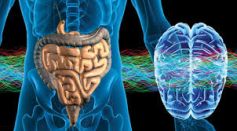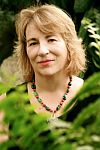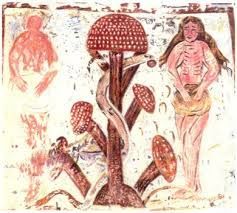Puerto Vallarta, Mexico - Frequently peoples of many cultures use plants and mushrooms in group rituals to alter consciousness; to commune with the gods or to stay alert while engaged in long hunting expeditions; or they are used individually to stimulate vision quests, to sleep, or treat pain and wounds. Entheogen refers to 'God within us,' those plant substances that, when ingested, give one a divine experience.
Human beings have been exploring and altering their states of consciousness since the first animals snuffled their way into a mound of mushrooms and shared their discovery with their two-legged companions. It is difficult to say which is older; the experience of trauma, or of religion.
The latter, some believe, may have dawned on the earliest hominids after the ingestion of some of nature's psychedelic bounty. Some scholars suggest that the apple of Eden was actually the psychoactive mushroom, Amanita muscaria. People have ingested psychoactive plants and mushrooms for millennia to enhance consciousness and as a route to ecstasy which refers to "the withdrawal of the soul from the body" concurrent with mystical or visionary states.
When the Spanish arrived in Mexico they suppressed not only the sacramental use of the mushroom, called Teonanacatl by the Nahua, meaning "Flesh of the Gods" but also ritual foods such as Amaranth, both of which were safeguarded by indigenous peoples for the future. By all accounts, use of Teonanacatl, alcohol and other mind-expanding ritual substances were regulated by the community and abuse was uncommon both among the northern and southern peoples of the hemisphere.
Many pharmaceuticals are derived from these plants whose chemical compounds are now extracted, synthesized and concentrated in laboratories. In addition to their medicinal uses, psychoactive plants and mushrooms are also used recreationally and ritually and therapeutically. Increasingly they are studied and applied in the clinical setting for the intractable symptoms of PTSD including depression hopeless, anxiety and "loss of spirit."
 |
It is at this intersection that a therapeutic approach to understanding psychoactive states and balances can be explored. The non-profit organization MAPS conducts clinical research worldwide on the therapeutic use of entheogens.
Trauma alters consciousness and it is no surprise that upwards of 70 percent of people with PTSD self-medicate to the point of addiction at some point in their lives. Many more people use substances but do not become addicted. Substance use intersects both the natural human urge for inner exploration along with the need to suppress unpleasant states. For example, cannabis suppresses memory which is why it may be a drug of choice among people who have PTSD and want to forget traumatic events.
Throughout my book Rhythms of Recovery, Trauma Nature and the Body, I have argued that PTSD disrupts the rhythmic function of consciousness and that our work must be to help our friends families and clients find natural ways to restore their sense of rhythm and balance; and to learn methods that they can use at home for self-care.
Historically, indigenous and traditional societies use psychoactive plants in the context of a community-based ritual. Under these conditions, the community and the ritual provide the setting to support the process of initiation and healing experienced by the participant user. Industrialized societies have lost many of these rituals and those that remain, even when they are religious, rarely involve the use of plants used to commune with God that practices that were central to early Christian and pagan worship in Europe.
Many of these traditions continue to evolve, for example the Native American church peyote ceremony practices in the United States' southwest and among the Wixárikas of central México, the Ayahuasca ceremonies practiced by Urarina shaman of the interior Amazon river regions of Peru, the mushroom cults of Siberia and the Mazatec of northwestern Oaxaca, México who refer to their preferred, trance-inducing mushroom as nti-si-tho, and in psychotherapeutic settings where individuals use substances under the guidance of skilled therapists or guides.
 |
The addicted brain needs physical nourishment and the brain/mind also needs spiritual nourishment that derives from transcendent vision and ongoing rituals of connection with others. Nature provides an abundance of plants for this purpose. One of our local plants, Capomo, is so rich in amino acids that café de capomo is well known as a mood booster. Likewise, good quality Kava supports GABA, the relaxation chemical in the brain. The rich tradition of fermented foods and drinks in Mexico supports the second brain, the probiotic rich gut bacteria that supports GABA and therefore relaxation. Food rich in good fats like avocados and olive oil support the brain which is mostly fat.
People with PTSD, depression and anxiety use a variety of medications to self-medicate. Understanding the types of drugs that people use help us understand more specifically the psychological, biological, and spiritual needs people have to support the conscious and healthy use of nature's plant medicines and spirit molecules.
 Dr. Leslie Korn has a clinical practice specializing in integrative mind/body medicine. She completed her training at Harvard Medical School. She directed a natural medicine health clinic in Cabo Corrientes for over 25 years and currently lives in Puerto Vallarta. She conducts research on culture, ethnobotany and culinary traditions of the west coast of Mexico, and is the author of 6 books including 'Nutrition Essentials for Mental Health' and 'The Good Mood Kitchen.' To learn more about her work, visit DrLeslieKorn.com, and healthalt.org.Dr. Korn can be reached via email at lekorn(at)cwis.org.
Dr. Leslie Korn has a clinical practice specializing in integrative mind/body medicine. She completed her training at Harvard Medical School. She directed a natural medicine health clinic in Cabo Corrientes for over 25 years and currently lives in Puerto Vallarta. She conducts research on culture, ethnobotany and culinary traditions of the west coast of Mexico, and is the author of 6 books including 'Nutrition Essentials for Mental Health' and 'The Good Mood Kitchen.' To learn more about her work, visit DrLeslieKorn.com, and healthalt.org.Dr. Korn can be reached via email at lekorn(at)cwis.org.


